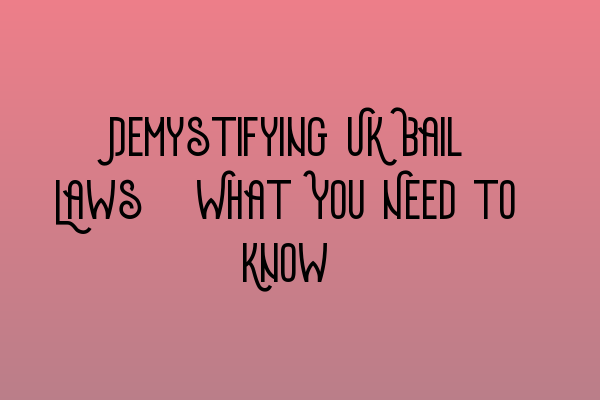Demystifying UK Bail Laws: What You Need to Know
When it comes to criminal law in the UK, one key aspect that often confuses individuals is the concept of bail. Whether you’re facing criminal charges yourself or simply interested in understanding how the legal system operates, having a clear understanding of UK bail laws is crucial. In this comprehensive guide, we’ll break down the key aspects of bail, what it entails, and how it affects individuals involved in criminal cases.
What is Bail?
Bail is a legal concept that allows individuals to be released from custody while they await trial or the resolution of their criminal case. It serves as a way to ensure that defendants appear in court for their hearings, while also providing an opportunity for them to continue with their lives and prepare for their defense.
In the UK, bail is governed by various legislations, including the Bail Act 1976 and the Criminal Justice Act 2003. These laws outline the criteria that determine whether an individual is eligible for bail and the considerations that courts should take into account when making bail decisions.
Eligibility for Bail
Whether or not an individual is eligible for bail depends on several factors. The court will consider the seriousness of the offense, the individual’s criminal history, the likelihood of the individual fleeing, interfering with witnesses, or committing further offenses, and the strength of the evidence against the individual. These factors help the court determine whether granting bail would be in the interest of justice.
If the court determines that bail should be granted, it may impose certain conditions. These conditions can include surrendering a passport, attending regular check-ins with the police, adhering to a curfew, or even residing at a specific address. These conditions help mitigate any potential risks associated with releasing the individual on bail.
The Bail Hearing Process
Understanding the bail hearing process is essential for anyone facing criminal charges. This process involves presenting arguments to the court that support the granting of bail. It is crucial to have a skilled criminal defense solicitor who can effectively represent your interests during this hearing.
SQE 1 Practice Mocks FLK1 FLK2
During the bail hearing, the defense solicitor will present the individual’s personal circumstances, employment situation, ties to the community, and any other factors that demonstrate the individual’s commitment to appearing in court and abiding by any bail conditions imposed.
The prosecution, on the other hand, may argue against granting bail based on the seriousness of the offense or the risk of the individual fleeing or committing further offenses. It is crucial for the defense solicitor to counter these arguments and present a strong case for bail.
SQE 2 Preparation Courses
It is important to note that bail decisions can be appealed if the initial application is denied. However, seeking legal advice and representation from an experienced criminal defense solicitor can increase the chances of a successful bail application during the initial hearing.
Once bail is granted, it is essential for individuals to comply with any imposed conditions and attend all court hearings. Failure to do so can result in the revocation of bail and potential further legal consequences.
Conclusion
Understanding UK bail laws is crucial for individuals involved in criminal cases. It allows them to navigate the legal system more effectively and make informed decisions regarding their defense. By having a clear understanding of bail eligibility, the bail hearing process, and the importance of legal representation, individuals can improve their chances of securing bail and continuing with their lives while awaiting trial.
For more information on the SQE exams, check out our related articles:
Stay informed and prepared for your future legal career!
